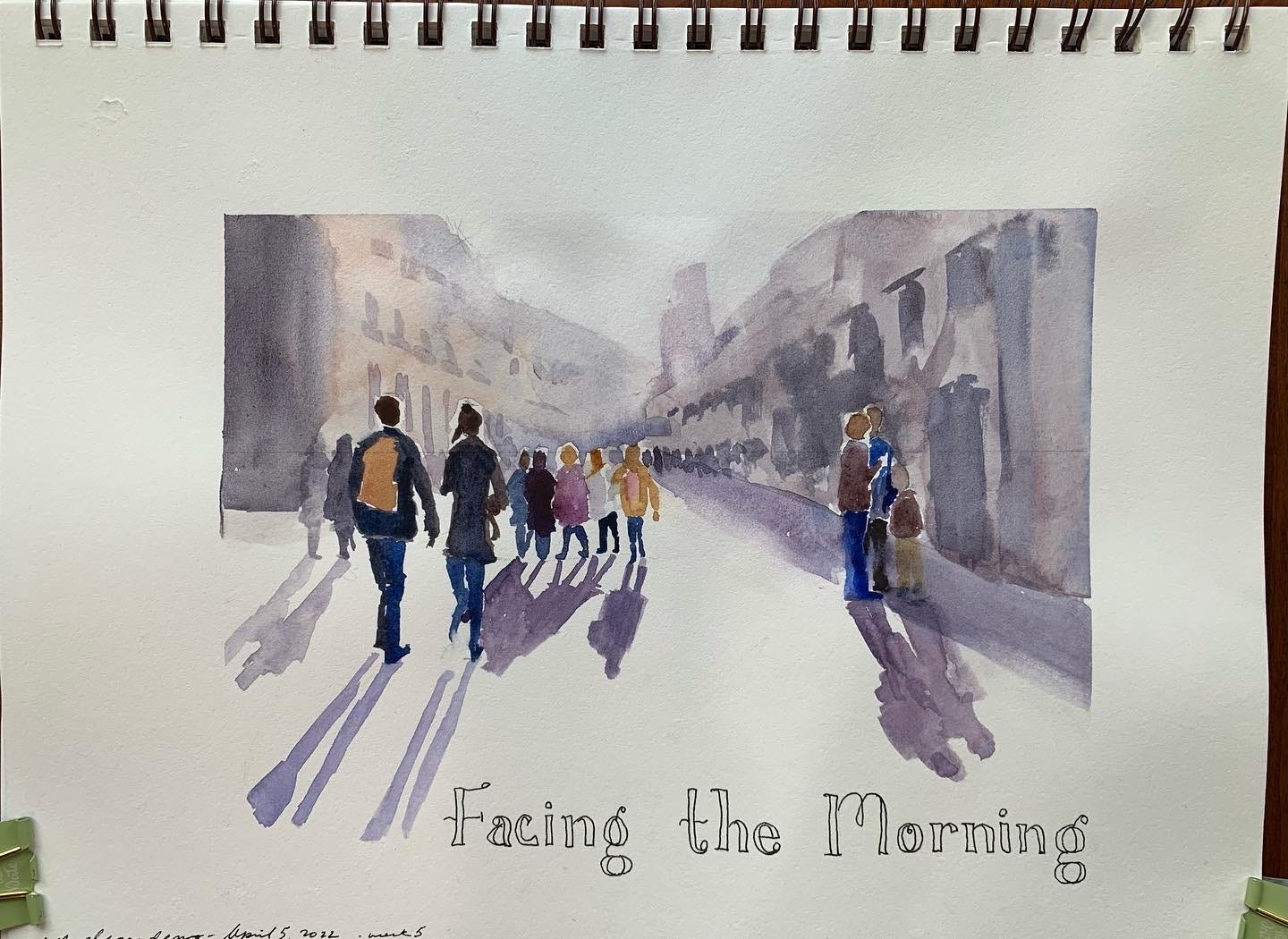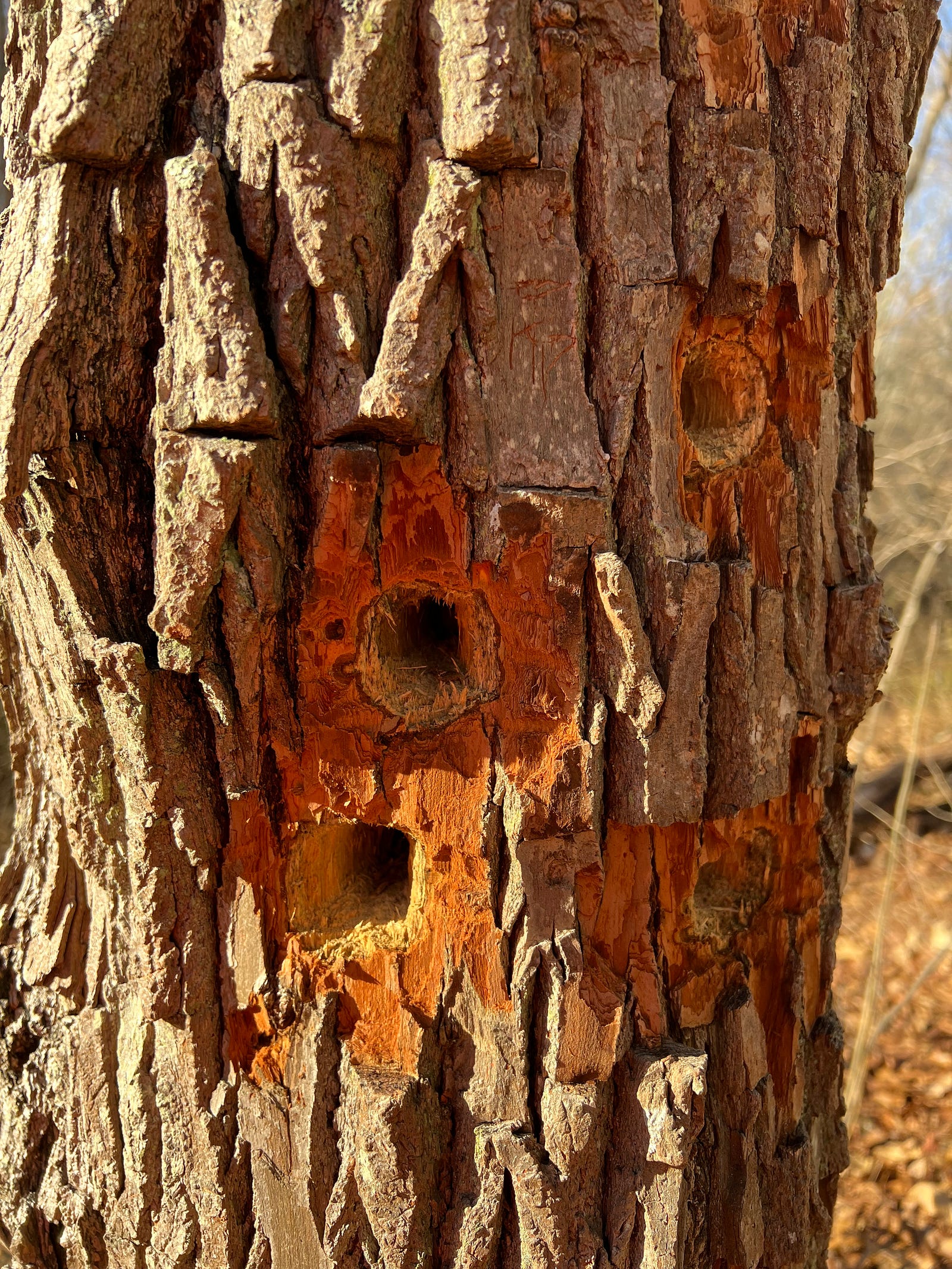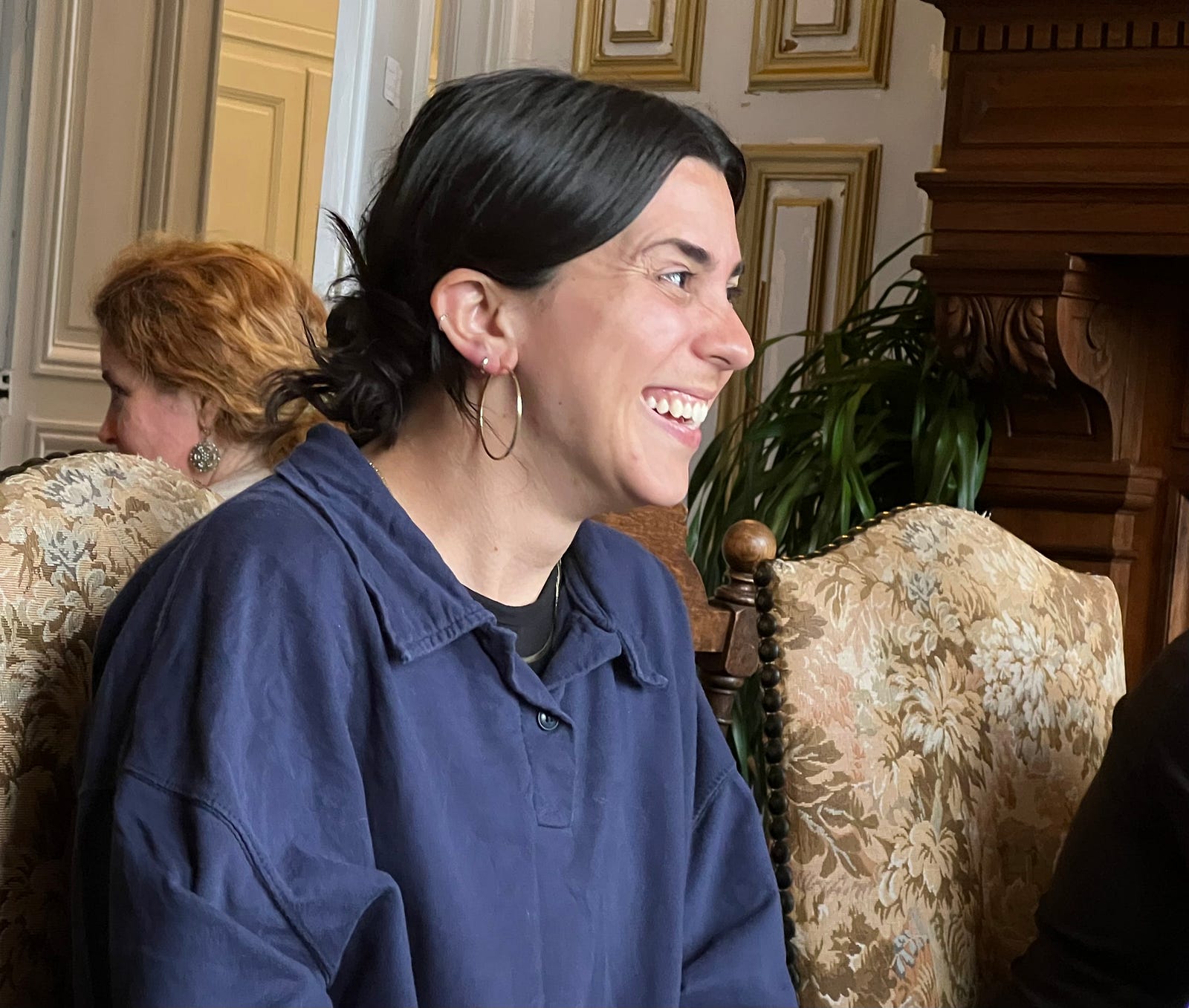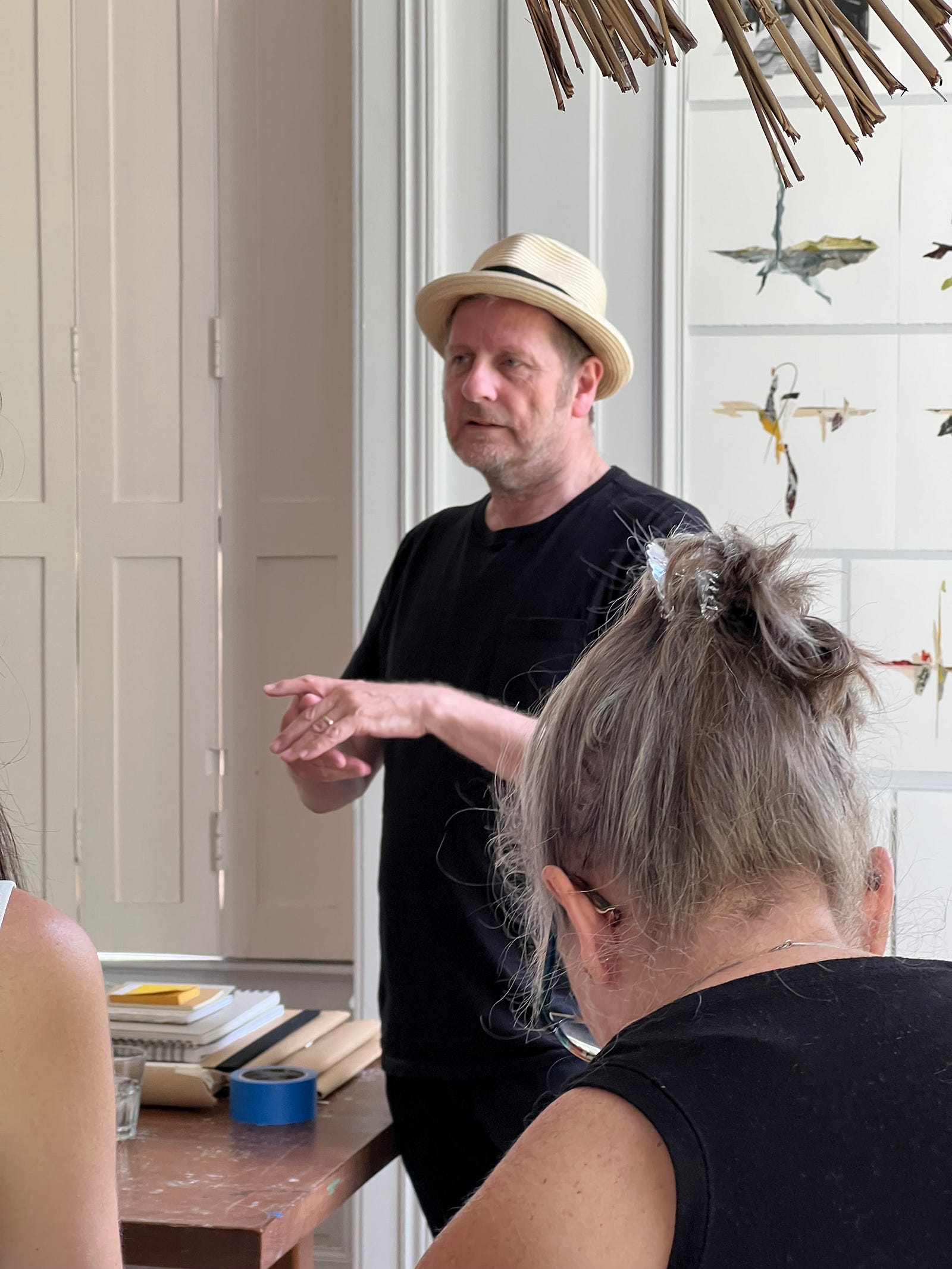Sermon: The Bedrock of Justice is Knowing One Another
Published by Ronald Steed,
Justice | Community Organizing | Relationship
Sermon: The Bedrock of Justice is Knowing One Another
St. Andrews Episcopal Church, Madison, CT ¹

Do we know each other well, or just in passing? | Photo and watercolor painting by Roxanne Steed in Florence Italy.
Taken from Matthew 5:21–37 (NRSV):
Jesus said, "You have heard that it was said to those of ancient times, ‘You shall not murder’; and ‘whoever murders shall be liable to judgment.’ But I say to you that if you are angry with a brother or sister, you will be liable to judgment; and if you insult a brother or sister, you will be liable to the council; and if you say, ‘You fool,’ you will be liable to the hell of fire. So when you are offering your gift at the altar, if you remember that your brother or sister has something against you, leave your gift there before the altar and go; first be reconciled to your brother or sister, and then come and offer your gift. Come to terms quickly with your accuser while you are on the way to court with him, or your accuser may hand you over to the judge, and the judge to the guard, and you will be thrown into prison. Truly I tell you, you will never get out until you have paid the last penny. You have heard that it was said, ‘You shall not commit adultery.’ But I say to you that everyone who looks at a woman with lust has already committed adultery with her in his heart. If your right eye causes you to sin, tear it out and throw it away; it is better for you to lose one of your members than for your whole body to be thrown into hell. And if your right hand causes you to sin, cut it off and throw it away; it is better for you to lose one of your members than for your whole body to go into hell. It was also said, ‘Whoever divorces his wife, let him give her a certificate of divorce.’ But I say to you that anyone who divorces his wife, except on the ground of unchastity, causes her to commit adultery; and whoever marries a divorced woman commits adultery. Again, you have heard that it was said to those of ancient times, ‘You shall not swear falsely, but carry out the vows you have made to the Lord.’ But I say to you, Do not swear at all, either by heaven, for it is the throne of God, or by the earth, for it is his footstool, or by Jerusalem, for it is the city of the great King. And do not swear by your head, for you cannot make one hair white or black. Let your word be ‘Yes, Yes’ or ‘No, No’; anything more than this comes from the evil one."
Please…
Please do not tear your eyes out or chop your hand off. Jesus’ suggestion that you should do yourself bodily harm is a figure of speech, common in his time among his people, intended to demonstrate one’s intensity on an issue by taking it to the extreme. I really worry about Christians who try to read the Bible literally on days like today! First, they miss a lot of the narrative’s subtlety, beauty, and nuance, and second, they might just harm themselves. So, no need for that.
Be Justice-Doing People
This reading from Matthew is part of Jesus’ Sermon on the Mount that takes up all of chapters 5, 6, and 7 in Matthew’s gospel and is a teaching given to his disciples so that they would understand his purpose and the radical way of his ministry. This section is sometimes called the "Five Torah Intensifications," in which Jesus offers a Torah law, "you have heard it said…" and then proclaims "but I say…" where he intensifies the rule to illustrate a deeper meaning that transcends the rule.

You can follow the rules and still do injustice | Photo by Ron Steed
It is as though Jesus is saying, "Listen, the law will only take you so far. You can follow the rules if you like and everyone will think you are a righteous person, but you will still miss out on a larger principle. You can follow the rules and still do injustice. I want you as disciples to be justice-doing-people, not just rule followers."
This is an insightful understanding of the Torah in my view and a great criticism of the religious leaders of his time who were trying to enforce the law. One thing about the times Jesus lived in, is that the Pharisee movement was a religious fundamentalist movement, not unlike some of the religious fundamentalist movements of our own time. The Pharisee's viewpoint was that Israel had lost its way and that only by returning to the strictness of the Law, would Israel be saved by God.
Jesus is saying to the Pharisees, "You think you are doing God’s will by following the Law, but you are not acting justly. You are missing the whole point of the Law, which is to see that God’s Justice is done on Earth. Worse, you are making up new rules as you go that compound the error. Your moment is missing the mark big time!"
Charity vs. Justice
Now, I’m not interested in going through the particular rules Jesus uses to illustrate his point, but I do want to linger on the deeper idea that doing justice is hard, and requires us to step back from whatever it is we are doing and take a closer look.
I’ve had new learning recently about justice. Justice and charity, while similar, are not the same thing. Charity is focused on meeting an immediate need, like food for the hungry, drink for the thirsty, welcome to the stranger, clothing for the naked, care of the sick, and visitation for the imprisoned… all those things Jesus mentions in Matthew 25.

Charity is not the same as Justice | Photo by Ron Steed
It’s not a complete list of charitable activities (and I don’t think Matthew or Jesus, intended to be one). Charity solves an immediate problem that can’t be solved by the suffering one. At its most urgent, it may very well save lives. It is an act that heals an immediate need.
Most of what churches do, this one included, are charitable, and there is certainly a need and call for action, but very little of what churches do really qualifies as justice, and justice is what Jesus is talking about in today’s gospel and throughout the Sermon on the Mount.
Just as Jesus is intensifying the Torah toward justice, justice is charity intensified to the point that it not only meets immediate needs but actually changes the system so those issues never become a need again in the future.
Faith-Based Community Organizing
And changing the system is a tall order for a parish like St. Andrews. If we wanted to change a policy in Madison or Hartford as an act of justice, no politician is going to be impressed by a priest, a deacon, and a couple of dozen parishioners, but they might be impressed by 50 pastors, imams, rabbis and a couple of thousand people of faith.
How do you get that many pastors and people together? Where would you start?
Fortunately for Connecticut, we already have two faith-based organizations in place that are already doing precisely the kind of justice I am talking about. One is called the Greater Hartford Interfaith Action Alliance (GHIAA) and represents 45 communities of faith in Hartford with over 15,000 members. GHIAA includes two Episcopal churches.

Politicians need to see mass plantings of people to be motivated toward Justice | Photo by Ron Steed
The other is called Congregations Organized for a New Connecticut (ConeCT) and consists of 39 faith communities along the Connecticut shoreline, including three Episcopal churches. A third organization is just beginning to organize in Southeast Connecticut and I am helping with that.
These organizations' sole purpose is to spread justice in their parts of Connecticut by working to change policies and build new structures that solve people’s needs. How do they decide what to work on? They canvas their membership in dozens of house meetings where parishioners like you tell the stories of injustice they are encountering. Those stories are carefully written down and verified by volunteers who do the research to validate what the stories are telling them.
Relationships — Trust — Stories
Now, how many stories are we talking about here? A dozen? A hundred? No… well over a thousand in GHIAA’s last house meeting drive. Out of those thousand carefully recorded and validated stories, GHIAA chose justice issues they could win in five major areas: Education, Gun Violence, Mental Health, Housing, and Environmental Justice, areas that a lot of you are concerned with. They are not out to solve these big problems, but rather, focused on issues within these problems that they can win. They chip away at the problem, one issue at a time.
Notice what they did and what they did not do. They did not start with a problem. They started with people… people they know really well. They listened to their stories: real stories of injustice that people were experiencing. They did the work to validate those stories. And then they looked at what the stories were telling them, to find the issues they were going to work on. The action of justice rose from within… from relationships.

Artist Natalia Almonte. Heart-stories connect us deeply, sometimes delightfully | Photo by Ron Steed
And this is the bedrock of justice. To do justice, you have to be in relationship… deep relationship. Doing charity does not require us to be in relationship with the ones who are suffering. We might meet them (I hope so). We might have a conversation with the ones who are suffering, but charity does not require more than a brief interaction.
Justice requires a deep relationship—the kind of relationship in which heart stories are exchanged because when you can exchange heart stories with another person, you can establish the kind of trust in which they will tell you their own stories of injustice. Relationship — Trust — Stories. There are no shortcuts to that progression. Justice is built on that rock.
The Authority of Knowing People Well
And this is what Jesus is doing during the Sermon on the Mount. He is not just proclaiming his agenda in a vacuum but is recounting back to his disciples the stories of injustice he has heard and how his way of justice (God’s way of justice), will bring justice to them. This is all thanks to the deep relationships Jesus has made, the stories they have told one another, and the mutual trust he has developed.
The Sermon on the Mount resonates with his disciples because it draws on their own stories. The end of chapter 7 says, "the crowds were astounded at his teaching, for he taught them as one having authority, and NOT as their scribes." The authority that Jesus had rested foundationally on the relationships he had formed… the scribes didn’t do any of that.

Artist Clive Knights conveys authority in his works. His authority rests on the deep relationships he formed with the other artists | Photo by Ron Steed
Jesus heard their stories of mourning, meekness in the face of power, and hunger for people who will act rightly. The need for mercy, poverty of every kind, peacemaking, and the injustice of divorce (which, at that time, could be a death sentence for a woman), the lack of authentic relationships, and oaths made that went unfulfilled. Jesus is not proclaiming charity with his Torah intensifications; he’s proclaiming justice.
And what’s striking about Jesus’ way of justice, is that he is not going to use the Roman methods to get there. He is not telling his disciples to use power over others, violence, extraction, exploitation, exclusion, manipulation, racism, transactional relationships, or hustle culture; all the methods the world still uses.
Rather, Jesus will bring justice through power sharing, symphony, harmony, flourishing, thriving, wholeness, abundance, forming beloved communities, unconditional love, and being friends with a God who scatters blessings like seeds. This is not the way of the world, but it is God’s way of justice.
Jesus really doesn’t want you to tear your eyes out or chop your hand off, but he is serious about justice and wants you to know it. I’m wondering how we might answer that call here at St. Andrews. I’m wondering if we might have a future with a faith-based community organization like ConeCT. If we do, I know what the first step is; it’s to get to know one another more deeply than we do. That’s what the bedrock of justice is. Amen.
¹ This sermon was delivered at St. Andrews Episcopal Church, Madison, CT, on Sunday, February 22, 2023, Sixth Sunday after the Epiphany (Year A)
The Rev. Ron Steed is an Episcopal Deacon in Southeast Connecticut and has served the New London Homeless Hospitality Center in a variety of ways. He writes haiku and lyrical prose that he hopes will help others put the head and heart in right-relation.
Top writer in: Art, Watercolor, Haiku, Sermons, Refresh the Soul Weekly, and Episcopal Church.

Ron Steed